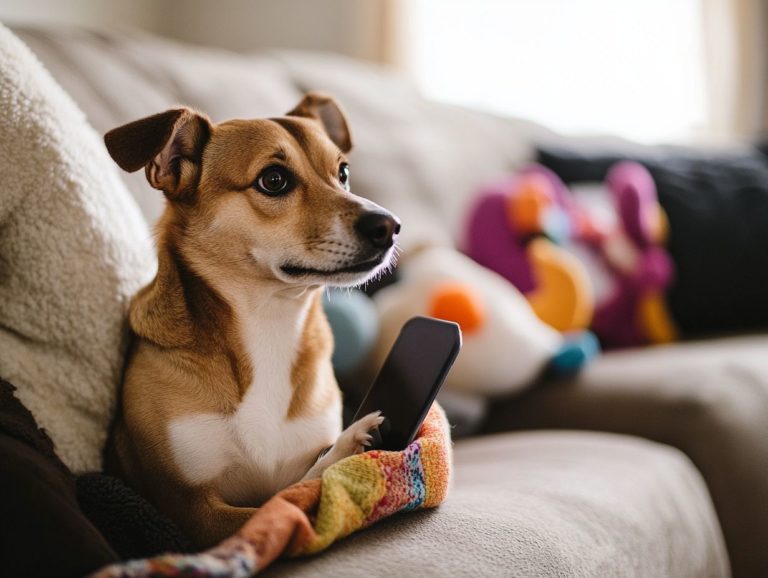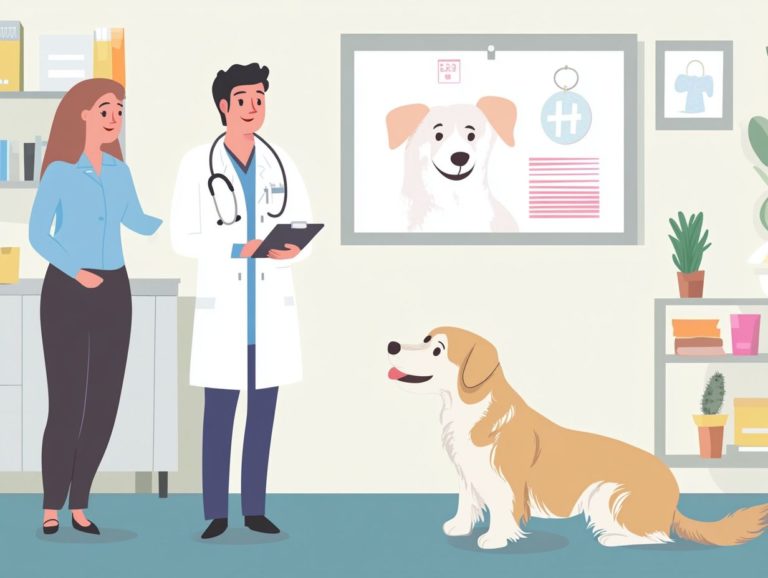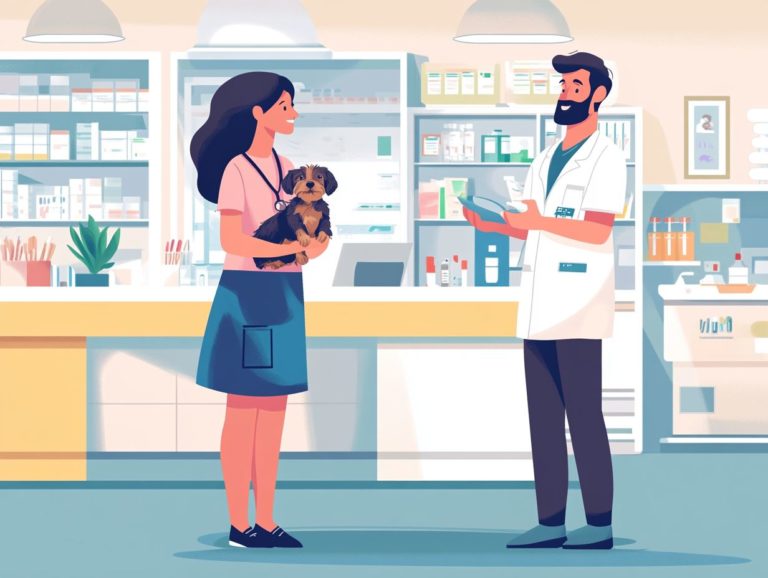How Pet Anxiety Specialists Diagnose Issues
Pet anxiety is an increasingly prevalent issue among pet owners, impacting a multitude of furry companions in diverse and challenging ways.
From incessant barking to destructive behaviors, the signs can be quite concerning. This article looks at the common causes and symptoms of pet anxiety, highlighting the role of specialists in diagnosing and addressing these issues, along with the various treatment options available.
By grasping how to collaborate effectively with pet anxiety specialists, your pet s happiness depends on it!
Let s dive in and discover how to help your anxious pet now!
Contents
- Key Takeaways:
- Understanding Pet Anxiety
- The Role of Pet Anxiety Specialists
- Diagnosing Pet Anxiety
- Treatment Options for Pet Anxiety
- Working with a Pet Anxiety Specialist
- Frequently Asked Questions
- Can pets really have anxiety issues?
- What are some common signs of pet anxiety?
- How do pet anxiety specialists diagnose anxiety issues in pets?
- What types of observations do pet anxiety specialists look for?
- Do pet anxiety specialists use any specific tools or tests for diagnosis?
- Are there any treatments available for pet anxiety?
Key Takeaways:
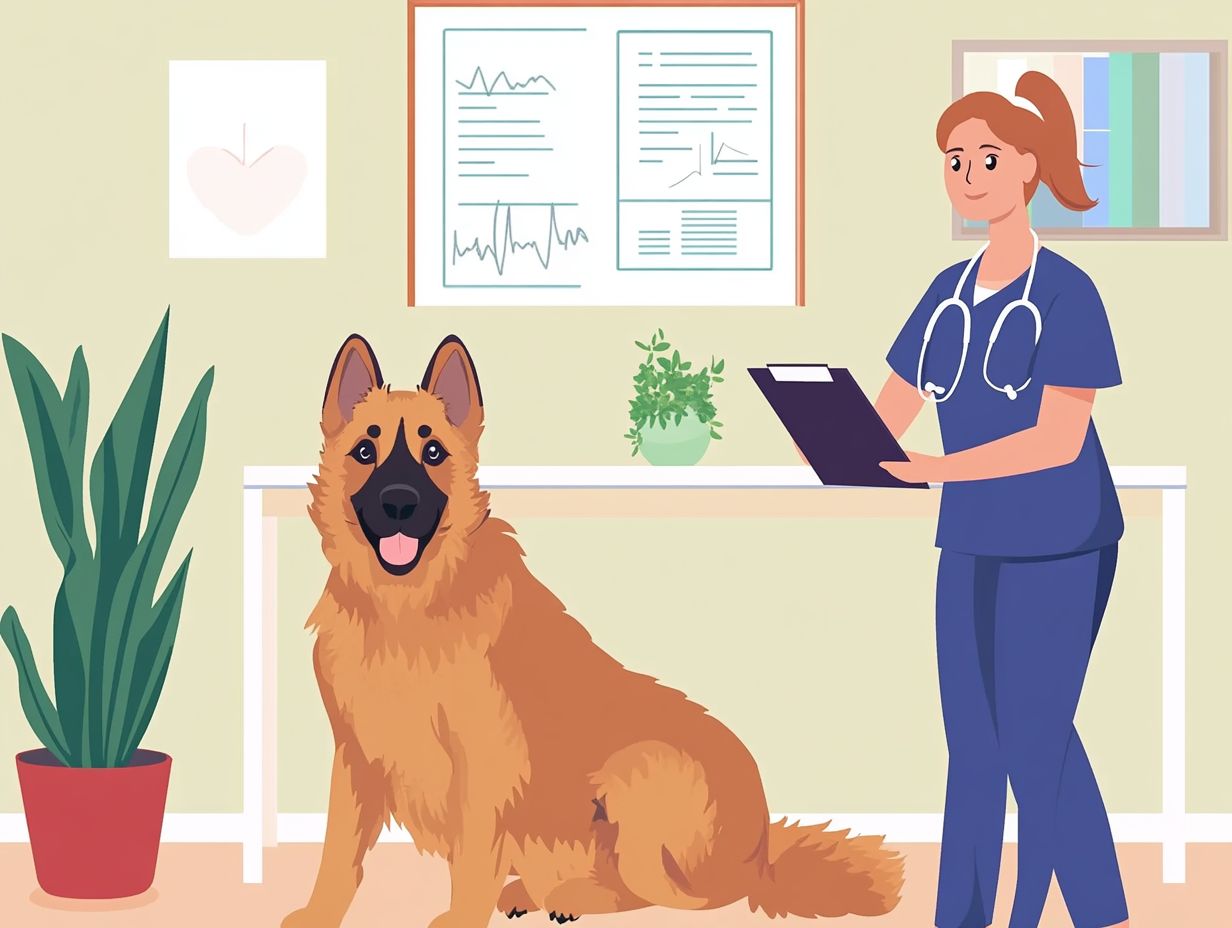
- Pet anxiety specialists play a crucial role in diagnosing and treating anxiety in pets, helping them live happier and healthier lives.
- Diagnosing pet anxiety involves a thorough assessment and evaluation of the pet’s behavior and environment to determine the underlying causes.
- Treatment options for pet anxiety may include medication, therapy, and other approaches. Working with a pet anxiety specialist can help improve the effectiveness of these treatments.
Understanding Pet Anxiety
Ever wondered why your dog is acting differently? Understanding pet anxiety is essential for you as a dog owner, as it encompasses a broad spectrum of behaviors and symptoms that can profoundly impact your dog’s emotional health and physical well-being.
Anxious dogs may display signs such as excessive barking and inappropriate urination or defecation, often stemming from various environmental factors or common triggers like separation anxiety and a fear of loud noises.
By recognizing these symptoms, you enable veterinarians and dog trainers to implement effective treatment strategies tailored specifically to meet the unique needs of your canine companion.
Common Causes and Symptoms
Common causes and symptoms of pet anxiety in dogs can vary greatly. Triggers like separation anxiety, fear of thunderstorms, and noise sensitivity are particularly common. These underlying issues often reveal themselves through behaviors such as excessive barking, aggression, or even self-injury, underscoring the necessity of identifying and effectively addressing the root causes.
Environmental factors such as changes in the household, the introduction of new pets, or relocating can profoundly impact a dog’s emotional state, frequently leading to increased anxiety levels.
Additionally, health conditions like chronic pain or sensory impairments can intensify stress signals, resulting in more noticeable behavioral changes.
Specific anxiety disorders, including generalized anxiety and social anxiety, can manifest through observable symptoms like panting, trembling, or a reluctance to engage in usual activities. Recognizing these signs is essential for you as an owner, enabling you to take proactive steps that will enhance your furry companion’s well-being and overall quality of life.
The Role of Pet Anxiety Specialists
The role of pet anxiety specialists is crucial in addressing the needs of anxious dogs while guiding you in understanding what to expect during a pet anxiety assessment and your pet’s emotional responses to anxiety-inducing situations.
These specialists veterinarians, animal behaviorists, and dog trainers use a range of treatment strategies, including behavioral modification and desensitization techniques, to alleviate your dog’s anxiety symptoms. This may include slowly exposing your dog to stressors in a controlled way.
They provide education on preventive measures and coping strategies. This knowledge helps you improve your pet’s emotional health and overall well-being.
What They Do and How They Help
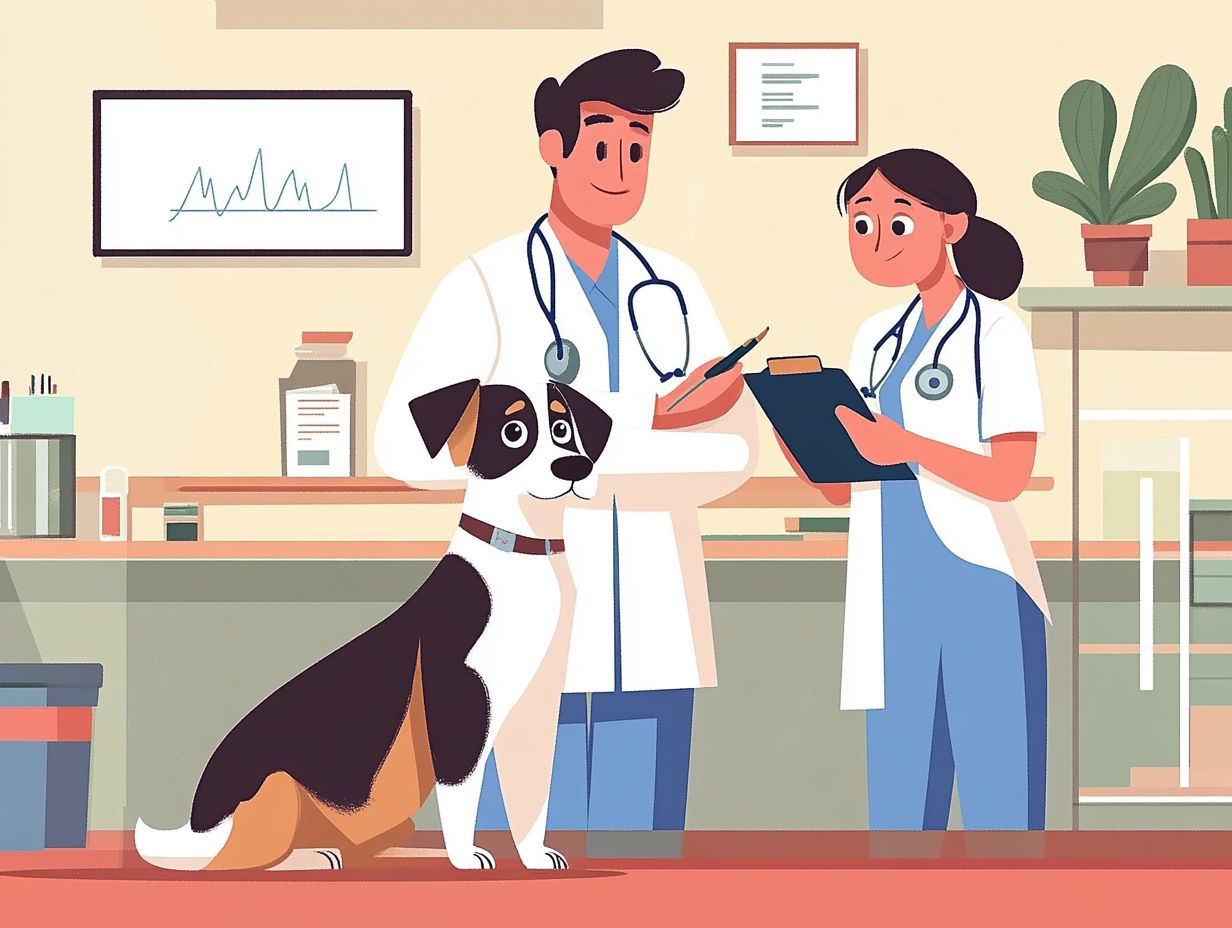
Pet anxiety specialists are essential in diagnosing and treating anxious dogs. To get the most out of your consultation, consider the top questions to ask your pet anxiety specialist. They use various methods tailored to meet the specific needs of each animal.
During consultations, they engage with you and assess your dog’s behaviors and symptoms. They recommend treatment options that might include changing behaviors, medication, or even natural therapies like CBD oil for anxiety relief.
Beyond these assessments, specialists also create individualized treatment plans. These plans incorporate a range of behavioral training techniques aimed at reducing anxiety triggers.
For instance, techniques such as desensitization gradually getting your dog used to things that scare them and positive reinforcement help create a sense of safety and security for your dog.
Mental stimulation is a key component of these plans. Specialists often recommend interactive toys or puzzle feeders to keep your dog’s mind engaged.
They consider the unique characteristics of different breeds. For example, high-energy breeds may thrive with increased physical activities, while more timid dogs might benefit from gentle exposure to new environments at their own pace.
Diagnosing Pet Anxiety
Diagnosing pet anxiety requires a thorough evaluation by veterinarians or trained specialists. They assess your dog’s symptoms and behaviors using various techniques, and understanding what makes a great pet anxiety specialist can help you choose the right professional for your furry friend.
This process often involves direct observation, questionnaires for you as the dog owner, and consultations on the role of veterinary professionals in pet anxiety aimed at pinpointing specific anxiety disorders.
This comprehensive approach allows for a customized treatment plan tailored to your canine companion s needs.
Assessment and Evaluation Techniques
When assessing and evaluating pet anxiety, you’ll encounter techniques like behavioral observation. To make the most of the process, it’s helpful to understand how to prepare for a pet anxiety consultation. Veterinarians and specialists keenly watch how your dog reacts to various stimuli.
Questionnaires also play a pivotal role, gathering insights from you about your pet s behaviors and emotional responses.
These observations typically take place in controlled environments to provoke authentic reactions. This offers invaluable insights into your dog s behavior in different scenarios, such as during loud noises or around unfamiliar faces.
Monitoring techniques may include closely observing body language, vocalizations, and interactions with both humans and other animals. Your feedback is crucial; you can provide nuanced details about your pet s routines and habits.
This leads to a deeper understanding of what triggers their anxiety. Common evaluation methods, such as standardized anxiety scales, help establish a baseline for tracking changes over time.
This ultimately guides treatment options and enhances your pet’s overall well-being.
Treatment Options for Pet Anxiety
Treatment options for pet anxiety are varied and sophisticated. They include medication, behavioral therapy, and natural therapies like CBD oil.
Each treatment plan is carefully customized to meet your dog’s unique needs. The focus is on alleviating symptoms and enhancing overall emotional well-being.
Techniques such as training, exercise, and proper nutrition play pivotal roles in this holistic approach. This ensures that your furry companion can thrive.
Your dog deserves the best care! Don’t wait seek help today!
Medication, Therapy, and Other Approaches
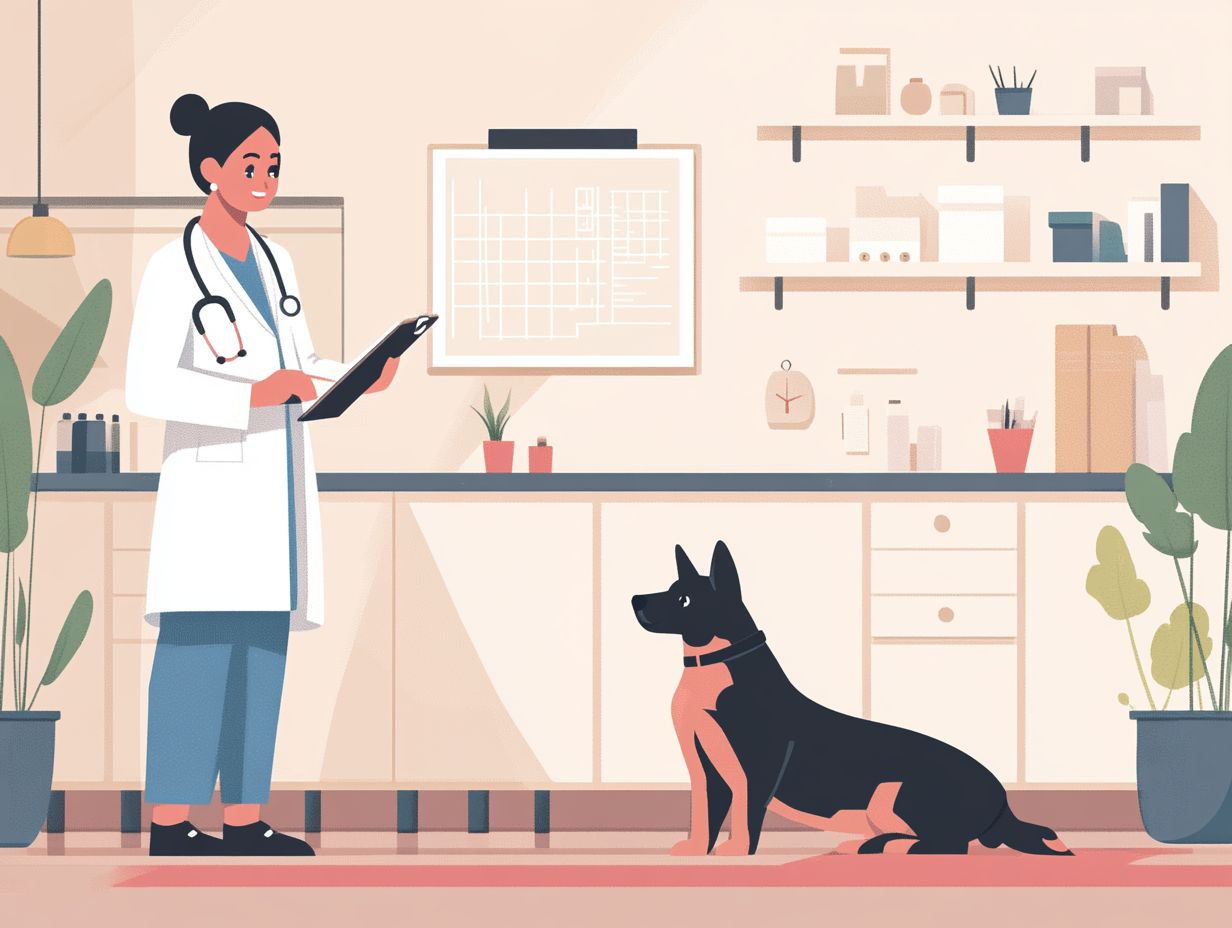
Medication for pet anxiety may include prescriptions like clomipramine and fluoxetine, often paired with behavioral therapy and other strategies to amplify treatment effectiveness. You might also consider natural therapies such as CBD oil, which has gained attention for its potential to soothe anxiety symptoms in dogs.
Many veterinarians recommend a tailored treatment plan that suits your dog’s unique personality and symptoms. For example, if your dog experiences social anxiety, gradual desensitization techniques combined with calming medications could be beneficial.
In contrast, addressing separation anxiety might involve crate training and establishing consistent routines. Making environmental adjustments, like creating a safe haven for your pet, can significantly improve their well-being.
Using pheromone diffusers can also help soothe anxiety symptoms. Keeping a close eye on your pet s response to these treatments allows you to fine-tune the mix of medications and behavioral strategies, ensuring the best possible outcomes.
Working with a Pet Anxiety Specialist
Collaborating with a pet anxiety specialist is a wise investment for dog owners dedicated to enhancing their pets’ emotional well-being and tackling behavioral challenges.
These specialists offer insightful consultations, equipping you with effective training methods, preventive techniques, and customized behavioral modification strategies designed to manage anxiety with finesse.
What to Expect and How to Prepare
When you engage with a pet anxiety specialist, you can anticipate a thorough consultation that delves into your dog’s behaviors, symptoms, and any prior training or treatment experiences. To make the most of this consultation, it’s wise to gather detailed information about your dog’s history and specific events that trigger anxiety. Additionally, understanding how to identify if your pet has anxiety can be incredibly helpful.
This preparation lays the groundwork for a comprehensive assessment, which is crucial for developing effective strategies tailored to your dog’s unique needs. Be sure to note specific instances of anxious behavior like excessive barking, destructive tendencies, or fearful reactions in various situations.
Formulating questions about the options for managing anxiety, including potential behavioral therapies or medications, can provide valuable clarity. During the consultation, the specialist will evaluate the information you’ve gathered and engage in an insightful dialogue to help identify the root causes of your dog’s anxiety.
This collaborative approach ensures a customized dog training regimen is developed, paving the way for effective prevention strategies that resonate with your dog’s temperament and lifestyle, especially in regard to common symptoms of anxiety disorders.
Frequently Asked Questions
Can pets really have anxiety issues?
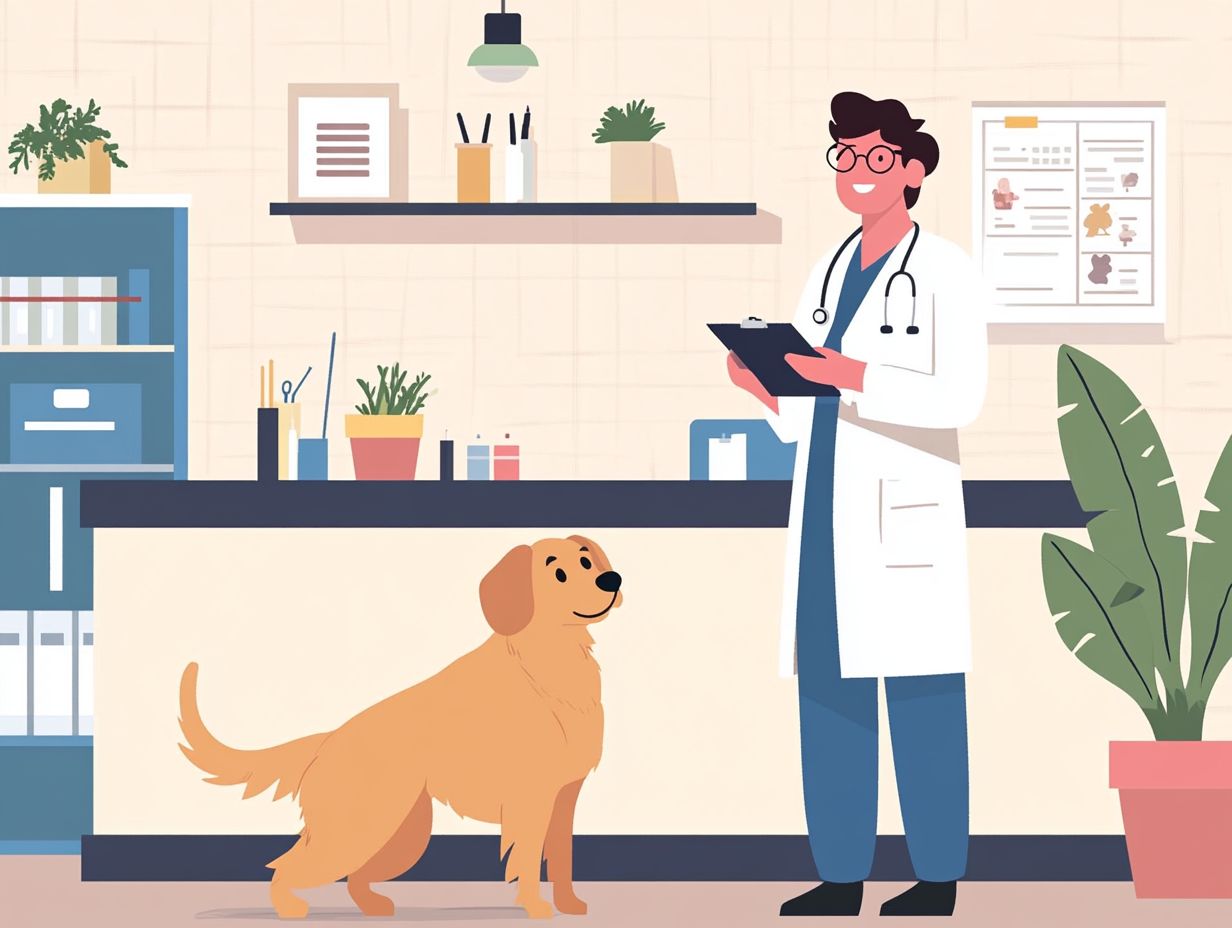
Yes, just like humans, pets can experience anxiety and exhibit symptoms such as excessive barking, destructive behaviors, and avoidance of certain situations.
What are some common signs of pet anxiety?
Some common signs of pet anxiety include excessive panting, pacing, shaking, loss of appetite, and even urinating or defecating inappropriately.
How do pet anxiety specialists diagnose anxiety issues in pets?
Pet anxiety specialists look at your pet’s behavior and health to figure out if anxiety is a problem. To ensure you find the right help, learn how to identify qualified pet anxiety professionals. They use a combination of observations, physical exams, and behavior assessments.
What types of observations do pet anxiety specialists look for?
Pet anxiety specialists observe a pet’s interactions with its environment, other animals, and its owner to identify potential triggers or sources of anxiety. Learning how to choose a specialized pet anxiety approach can also help address environmental factors and stress levels effectively.
Do pet anxiety specialists use any specific tools or tests for diagnosis?
Yes, pet anxiety specialists may use tools such as anxiety scales and questionnaires, as well as resources like the Merck Veterinary Manual, to gather information and assess the severity of a pet’s anxiety. Additionally, knowing how to document your pet’s anxiety symptoms can greatly enhance the assessment process.
Are there any treatments available for pet anxiety?
Absolutely! Pet anxiety specialists can help your furry friend feel better.
They often use a mix of techniques, including behavior changes, medication like clomipramine or fluoxetine, and modifying the environment.
These steps can significantly reduce your pet’s anxiety.

